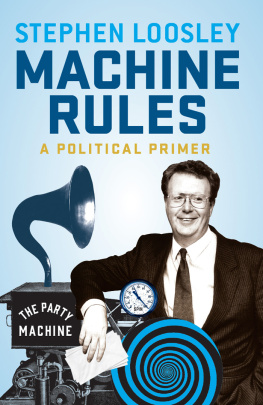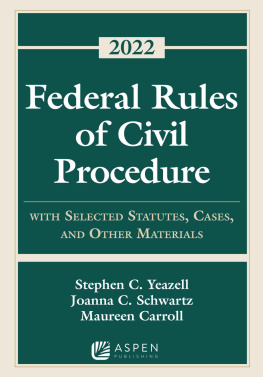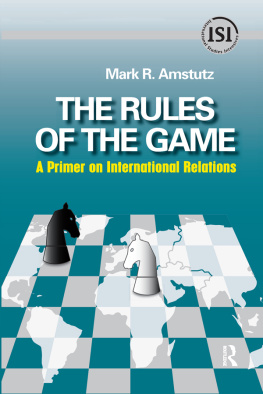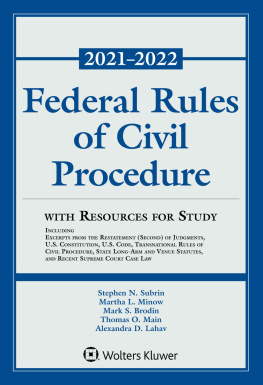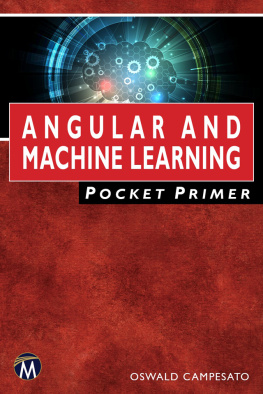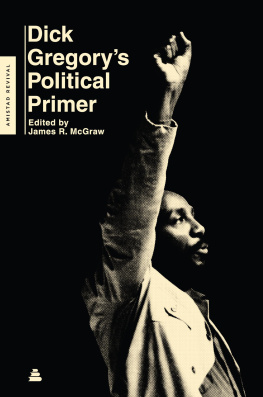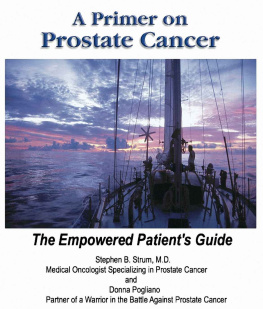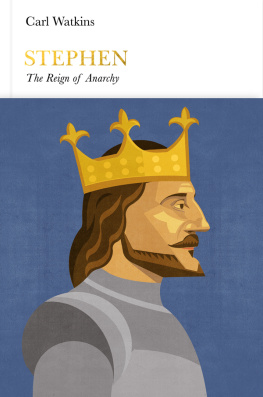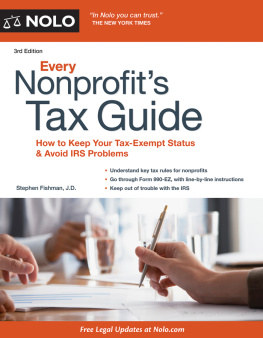MELBOURNE UNIVERSITY PRESS
An imprint of Melbourne University Publishing Limited
1115 Argyle Place South, Carlton, Victoria 3053, Australia
www.mup.com.au
First published 2015
Text Stephen Loosley, 2015
Design and typography Melbourne University Publishing Limited,
2015
This book is copyright. Apart from any use permitted under the Copyright Act 1968 and subsequent amendments, no part may be reproduced, stored in a retrieval system or transmitted by any means or process whatsoever without the prior written permission of the publishers.
Every attempt has been made to locate the copyright holders for material quoted in this book. Any person or organisation that may have been overlooked or misattributed may contact the publisher.
Text design and typesetting by Typeskill
Cover design by Philip Campbell Design
Printed in Australia by McPhersons Printing Group
National Library of Australia Cataloguing-in-Publication entry
Loosley, Stephen, 1952 author.
Machine rules: a political primer/Stephen Loosley.
9780522867404 (paperback)
9780522867411 (ebook)
Includes index.
Loosley, Stephen, 1952-
Australian Labor PartyBiography.
PoliticiansAustraliaBiography.
AustraliaPolitics and government.
324.29407092
For Lynne, Nicholas and James, and for the many thousands of
ALP members and supporters who gave me a chance to serve.Preamble: Knees up Mother Brown
The thin blue line looked distinctly menacing. On the western side of George Street in Sydneys CBD, across from Australia Square, the New South Wales Police were assembling. Some had already removed their identifying numbers. They were intent on inflicting a coordinated physical assault on the people across the street, some of whom had spilled onto the roadway.
It was late one spring afternoon in September 1970. The best part of 30 000 people had assembled in Wynyard Park for a moratorium meeting and march against Australias involvement in the Vietnam War. Twenty-year-old males were being conscripted for service in the Australian Army. Considering that twenty-year-old Australian males did not even have the vote, it seemed more than a shade unfair that they should die in paddy fields for questionable causes without even having the franchise.
Among the university students, unionists and just plain ordinary folk were four young Sydney Tech High School kids who had skipped their afternoon classes to participate. The deputy headmaster at Tech would later refer to our actions, which we repeated for anti-war demonstrations on other occasions, as the Moratorium sneak-out. No matter. My mates and I were strongly opposed to the US and Australian intervention in the war, with its tapestry of lies and indiscriminate slaughter. So we stood up, to oppose what we believed was wrong.
I was genuinely scared as I watched the cops across George Street link arms and advance in a canter towards us. They finished at speed and crashed into the protesters, some with their knees up. People went backwards. People went down; some were down for the count. Everyone was crushed together on the sidewalk and against the buildings.
Knees up Mother Brown.
I knew this expression from having played Rugby League (with real enthusiasm but without much skill). It referred to a tackle where a defender leapt into the air and, gripping the ball carrier around the neck and shoulders, slammed their knees into the opponents chest. It was a devastating play that was eventually banned, obviously for good reason. You think the shoulder charge is dangerous.
But on that day in Wynyard Park, we were not on the football field. We were trying to protest peacefully, albeit noisily, in the tradition of Australian democracy. I did not see a single demonstrator raise a hand in anger. This was a peaceful assembly. However, the following day, there was to be a by-election in a southern Sydney marginal seat called Georges River. The ALP candidate was the youthful and energetic Frank Walker. NSW Premier Robin Bob Askin wanted a police riot on the streets of Sydney, to lift the conservatives chances of winning. His policebrutal and venal in equal measureobliged.
Askin is still widely derided as having been among the most corrupt of the states premiers, linked closely to both crooked cops and illegal gambling interests. But there was something else to him. He was a thug, as confirmed by his declaration to run the bastards over during an anti-war demonstration in Sydney in 1966 against visiting US President Lyndon Baines Johnson.
On the afternoon of the September 1970 moratorium march, there were some 300 arrests, and the violence was ongoing for hours. Overwhelmingly, the cops caused the trouble. From the provocative confiscation of anti-war signs and demands that other protest banners be dismantled, to more heavy-handed tactics, this was a determined police effort to confront the demonstrators.
This was a new experience for me, a view of police work that was alien. Here was the state, my home state, deploying its uniformed agents against its own citizens in pursuit of a political objective for Bob Askin and the conservative parties. It was a revelation to my seventeen-year-old student self. It pushed me firmly onto the Left of the political spectrum, making me determined to change a system that produced state-sponsored violence.
And as it turned out, the voters were not fooled, despite the headlines. Labor won Georges River with a bit to spare.
Adding fuel to my idealism, the following year there was a Springbok Rugby tour of Australia. The South African team had, of course, been selected on a racial basis, as apartheid still reigned in the Republic. The Australian Council of Trade Unions, whose president was Bob Hawke, stepped up to the crease and applied a transport ban to the tour. Demonstrations greeted the Rugby team just about everywhere (funnily enough, a young Graham Richardson narrowly avoided arrest in one of the Sydney demonstrations). The flashpoint came when the Liberal prime minister of the day, Billy McMahon, offered to deploy the Royal Australian Air Force to transport the Springboks around, thereby negating the trade union ban.
Federally, the conservative parties were led by people who were particularly difficult to respect. Indeed, McMahon was an utter joke, including to more than a few in his own party.
McMahon had followed Jolly John Gorton into The Lodge following an internal party coup. Gorton, like others before him, had been almost sycophantic towards the United States in pursuit of favour. While his predecessor, Harold Holt, had declared that he was All the way with LBJ, Gorton had made absurd noises to the effect that Australia was simply part of the American posse, thereby planting the seed for the role of deputy sheriff embraced so willingly by the Howard Government many years later. This was stuff that caused reasonable Australians to cringe. Patrick White, the Nobel prizewinning author, described Gorton as giving the world the impression that we were a nation of rustic clowns.




